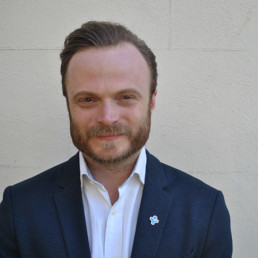
Written by Dominic Arnall
Chief Executive of Just Like Us, the LGBT+ young people's charity.
When Pride comes around, it can be easy to convince ourselves that so much has changed in terms of marriage and parental rights for adults, that it must be far easier growing up LGBT+ in 2021. Sadly, this is a common misconception and the research paints a much darker picture.
Just Like Us decided to commission independent research, conducted by Cibyl, to get a clear picture of how LGBT+ young people have been impacted, what is happening in terms of LGBT+ inclusive education, and how educators feel about implementing it.
When the pandemic began we expected that LGBT+ pupils may struggle more – perhaps stuck at home with unaccepting families, cut off from their usual support networks and struggling to find acceptance at school. What the independent research found was horrifying – LGBT+ young people are twice as likely to have contemplated suicide, and Black LGBT+ young people are three times more likely.
Our report, ‘Growing Up LGBT+’, surveyed almost 3,000 school pupils aged 11-18 (over 1,000 of whom were LGBT+) as well as more than 500 school staff. The results are very clear: LGBT+ young people are twice as likely to be worrying daily about their mental health and feeling lonely on a daily basis during lockdowns.
While the pandemic has of course been tough for everyone, including immense pressure on educators, it is devastating to see that LGBT+ young people are twice as likely to be struggling with their mental health and wellbeing on so many fronts – from depression to anxiety and panic attacks, there remains much work to be done.
LGBT+ school pupils are also twice as likely to have been bullied and just 21% told a teacher at school. Only 33% of LGBT+ pupils say there is a clear process for reporting anti-LGBT+ bullying in their school.
So what can we do? The good news is that the independent research found that pupils in schools where there is positive messaging about being LGBT+, pupils are less likely to have had suicidal thoughts and feelings – whether they are LGBT+ or not. The statistics are clear: all pupils benefit from a LGBT+ inclusion in schools.
74% of LGBT+ pupils who have never had positive messaging from their school about being LGBT+ have contemplated suicide but this drops to 65% when their school provides strong positive messaging about being LGBT+.
Non-LGBT+ pupils also benefit from LGBT+ inclusion in school – 33% of non-LGBT+ pupils who have never had positive messaging at school have contemplated suicide but this drops to 28% when there is strong positive messaging in their school.
A perhaps surprising finding from the independent research was also that the majority of all young people are very pro-trans. 84% of 11 to 18 year olds say they would proudly support a friend if they came out as transgender. 57% say they already have a friend who is trans. This really shows how important it is that we listen to young people’s voices and enable them to pave the way for positive change when it comes to LGBT+ equality.
Lastly, we are very concerned by the high proportion of LGBT+ educators who are facing challenges and fears about coming out at work and implementing LGBT+ inclusion in their schools. 40% of LGBT+ primary and secondary school staff are not out to their pupils.
Some might say that there’s no need to come out to pupils and there certainly should never be pressure on anyone to come out, but we are deeply worried about school staff who feel afraid to be themselves at work. No one should feel the need to hide who they are married to, who their families are or simply who they are in their jobs.
We also found that 31% of LGBT+ school staff say their colleagues or school board are a barrier to implementing LGBT+ inclusion in their school. The findings show there are still huge challenges that educators face in trying to bring about positive change and simply letting pupils know that: LGBT+ people exist and that’s OK.
As always, Just Like Us is here to support all educators – LGBT+ or not – with making schools safer and happier places for their pupils. You do not need to be an expert, it just takes a willingness to want to support LGBT+ young people who are so disproportionately struggling right now.
School Diversity Week is happening 21-25 June and it’s not too late to get involved. If you work in a primary school, secondary school or college, please sign up for free and we’ll send you a digital toolkit of resources for all key stages to help you celebrate.
Let’s create a world where LGBT+ young people can thrive.

